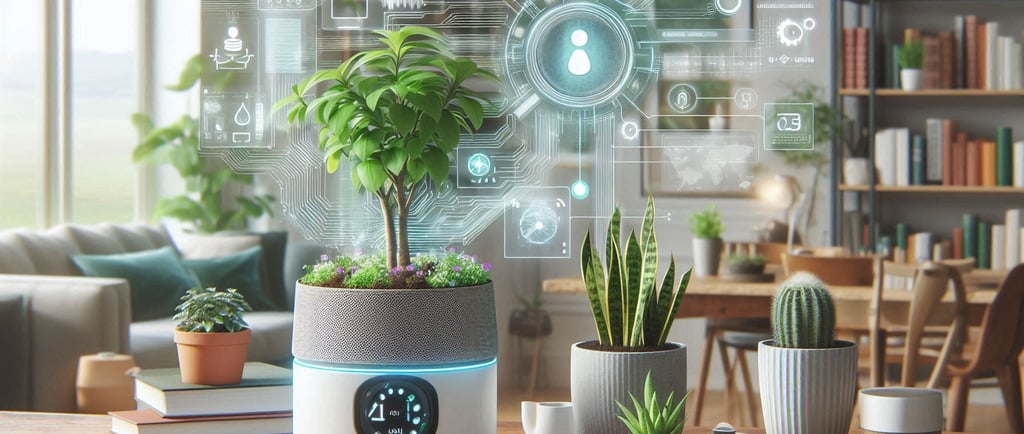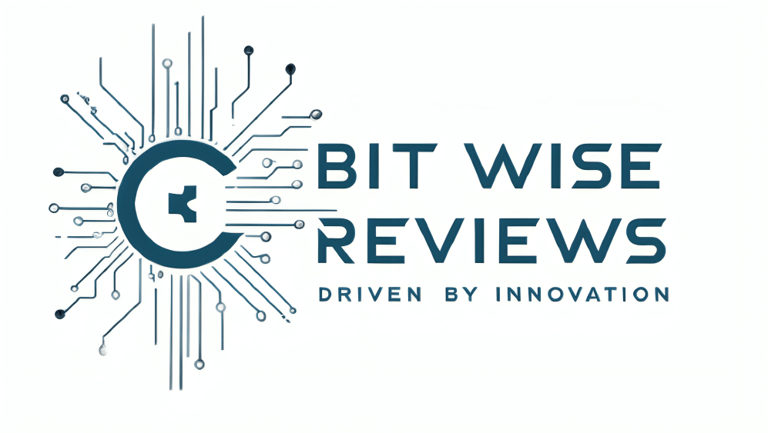Smart Indoor Gardening Solutions With AI-Powered Planters
Priyanshu- Bit Wise Reviews
9/7/2025


Introduction
The recent rise of indoor gardening occurred because people want their own fresh plants, and they want a more sustainable houseplant environment. Conventional indoor gardeners must learn about plant maintenance and watering practices as well as environmental conditions, yet these requirements make gardening difficult for both people who lead busy lives and novices. AI-powered planters represent an innovative solution that allows people to perform effortless and efficient indoor gardening. (Reference: clickandgrow)
Smart planters employ AI alongside automated watering functionality and real-time tracking capability, which effectively enhances plant vitality. The blog presents modern innovations in AI-powered planters together with their various advantages and essential characteristics for changing indoor growing practices.
Key Features of AI-Powered Planters
1. Self-Watering System
AI planters take away the need for guessing when it comes to irrigation schedules. The system determines optimal water distributions for plants through automated irrigation that bases quantities on development phases, along with external factors.
2. AI-Powered Growth Monitoring
The system conducts non-stop plant health monitoring through which it pinpoints nutritional deficiencies and disease problems. AI-powered equipment includes vision-based computing systems that both detect plant diseases and suggest resolution approaches.
(Reference: risegardens)
3. Smart Lighting Systems
Full-spectrum LED lights installed in indoor planters use automatic adjustment features that help promote plant growth despite low-light environments.
4. Voice Assistant Compatibility
Users can monitor their plants through voice commands because certain AI-powered planters integrate with Google Assistant, Siri, and Alexa.
5. Sustainable and Eco-Friendly Design
The planters demonstrate water-saving capabilities along with resource-efficient operation that leads to decreased environmental effects versus conventional gardening methods.
The Rise of Smart Indoor Gardening
Urbanization creates space constraints that force people to seek essential smart indoor gardening solutions for their gardening needs. Technology-driven planters equipped with AI provide users with a completely automated system for growing different types of plants indoors. Modern planters connect sensors and data analytical systems to automation functions, which allows them to create ideal growing parameters for plants, thus making gardening available for all users. (MDPI research on AI-based indoor planting)
Modern sustainable development, alongside environmentally conscious customer habits, drives customers to purchase smart gardening products. Darkfarming planters implement sustainability measures because they enhance water efficiency while eliminating waste production and letting plants grow continuously with no requirement for using pesticides or chemical fertilizers.
Modern planters employ artificial intelligence to monitor through sensors and automated processes the best possible environmental elements for growth. Here’s how they work:
1. Soil and Moisture Sensors
The devices continuously track soil moisture levels.
The system determines proper watering periods through its automatic control system so plants will not receive excess or insufficient water. (Source: aerogarden)
2. AI-Based Light Optimization
Built-in LED grow lights receive automatic adjustment through control settings that regard plant needs.
A technological solution that duplicates sunlight conditions helps plants accomplish efficient photosynthesis.
3. Temperature and Humidity Control
The devices measure environmental factors to manage temperature and humidity conditions, which promote ideal plant development. (Check how The LeafyPod smart planter maintains indoor climate balance automatically.)
4. Automated Nutrient Dispensing
The system determines exact nutrient requirements based on plant varieties.
The system provides plants with essential nutrients at specific moments for achieving proper development.
5. Mobile App Integration
Users can check their plants' growth patterns through the application and get notification messages while adapting care preferences using their smartphone devices.
Users can access guidance for plant care and both measure their plant growth and receive aid when dealing with problems.
Best AI-Powered Smart Planters in 2025
1. Click & Grow Smart Garden 9
The planter features a method for automated watering as well as LED lights that integrate with mobile device monitoring.
Ideal For: Growing herbs, leafy greens, and small vegetables indoors.
2. AeroGarden Bounty Elite
The product incorporates hydroponic technology with self-learning water and lighting capabilities, along with an interface that supports Alexa.
Ideal For: High-yield indoor gardening with minimal maintenance.
3. Rise Gardens Personal Indoor Garden
The system delivers nutrients with AI control, along with a modular architecture that provides real-time application updates.
Ideal For: Growing multiple plant varieties in a compact space.
4. Gardyn 3.0 Smart Garden
This product's vertical gardening system incorporates AI plant surveillance with smart watering capabilities.
The system serves city residents who need to harvest vegetables continuously throughout the year.
Benefits of AI-Powered Indoor Gardens
1. Convenience and Automation
The system takes care of plant watering along with fertilization, alongside light needs, thus requiring no human intervention.
The artificial intelligence manages plant care tasks that free novice gardeners from all planting responsibilities.
2. Year-Round Harvesting
People can cultivate fresh herbs, vegetables, and flowers at any time during the year, no matter what season it is.
The climate indoors remains unaffected by outdoor elements, permitting garden cultivation at any time.
3. Space Efficiency
The compact nature of AI-powered gardens lets them serve smaller building types and city apartments.
4. Health and Wellness Benefits
Indoor plants act as air quality improvers because they remove toxic substances from the environment while they produce oxygen.
The act of gardening reduces stress and delivers mental health benefits to people.
5. Smart Home Integration
The smart plantation technology works together with smart house electronics to enable users to have complete control over their planting system.
Also Read: Top Gaming Laptops 2025: Best Picks for Power and Value
Challenges and Considerations
1. Cost
AI planters cost more than both pots and planters combined.
AI planters will spend less money over time because they minimize the waste of water and nutrients.
2. Power Dependence
The operation of smart gardens depends mainly on electric power that sustains their LED light fixtures along with sensors and automated watering systems.
The solutions include additional backup batteries that enable garden users to continue operations when utility power becomes unavailable.
3. Limited Crop Variety
Small herbs alongside leafy greens and flowers represent the most suitable plants for AI planters to work with effectively.
The cultivation of bigger crops needs special hydroponic or soil-based cultivation methods.
Also Read: Waterproof Outdoor TVs: Enhancing Entertainment in Any Environment
Future Trends in AI-Powered Gardening
Advanced AI Learning Models
The upcoming generation of planters will use machine learning features that modify their operating systems based on how they develop plants during use.
Blockchain-Based Plant Tracking
The implementation of blockchain technology would provide transparent tracking for food production because it would establish methods to follow how plants receive care throughout their growth. Blockchain-based food tracking is already used in agriculture by platforms like IBM Food Trust
Augmented Reality (AR) Integration
Through AR technology, users can receive immediate visual instructions that help them perform pruning operations and execute transplanting procedures, and perform maintenance tasks.
Solar-Powered Smart Planters
Such energy-efficient garden systems operate using solar panel technologies. Devices like Click & Grow’s Smart Garden Solar options hint at more sustainable solar-integrated planters
Benefit from AI-Powered Indoor Gardens?
Urban dwellers with limited outdoor space.
Beginners with no prior gardening knowledge.
Working individuals who desire minimal care plants need this system for their greenery.
People who focus on health through organic food cultivation are among their priorities.
Also Read: Robotic Pool Cleaners for Automated Home Maintenance
Conclusion
Artificial Intelligence controls modern indoor planters, which offer simplified and highly efficient plant cultivation solutions to indoor gardeners. The planters deliver an easy gardening experience to all plant growers regardless of their experience level, through their AI-based monitoring system and automated watering combined with real-time feedback capability.
Smart indoor gardening will experience growing progression because technology shows no signs of halting its evolution. AI-powered planters represent the future of sustainable high-tech gardening since they enable gardening needs and green home decoration simultaneously. And as I look at how fast this space is evolving, I’m more convinced than ever that smart planters are about to reshape the way we grow our indoor gardens.
About The Author
Hey there! I’m Priyanshu, the founder and editor behind Bit Wise Reviews — a platform dedicated to making technology easy to understand for everyone.
I started this website with a simple idea:
“Tech doesn’t have to be complicated — it just needs to be explained the right way.”
INSIGHTS
Your go-to source for latest tech gadgets news
Support
Connect
© 2025. Bit Wise Reviews
+91 6377810443
Quick Links
